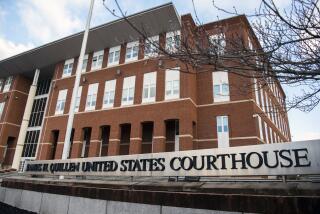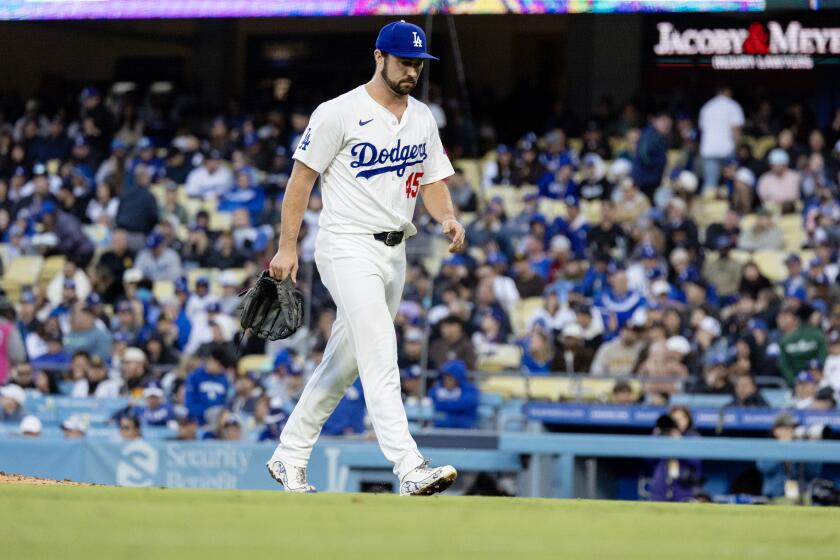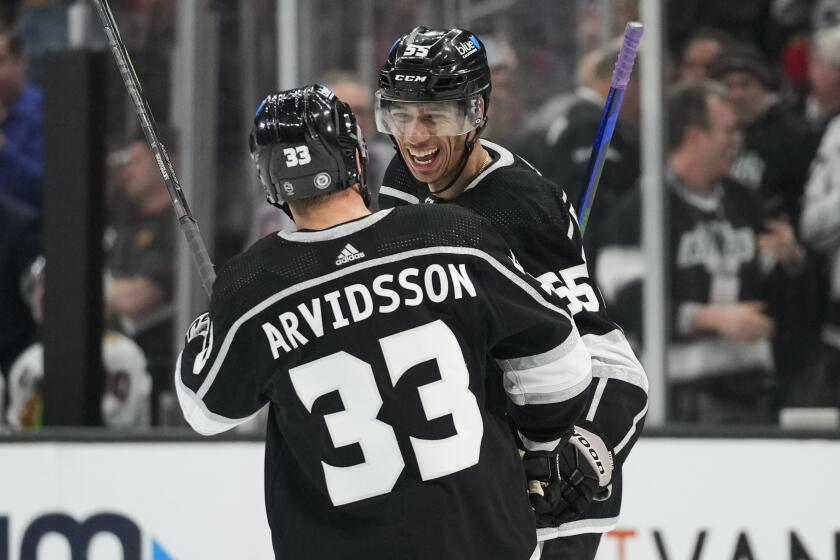Players’ union wins court ruling against NFL
Reporting from Chantilly, Va. — The fight between NFL players and owners — a battle of the haves and have-lots — is entering troubling territory.
The sides have been squabbling since 2006 over how best to divide what has grown to $9 billion in annual revenues. But, with the collective bargaining agreement expiring after Thursday and the likelihood of a player lockout looming, the immediate future of the nation’s most popular sports league is in doubt.
On Tuesday night, when the NFL and the union were concluding eight days of mediation in Washington, U.S. District Judge David Doty of Minnesota handed a victory to the players. He ruled that the league violated the CBA in negotiating a special provision in the television contracts that would ensure the owners would be paid $4 billion even if there was no season. The players argue the league didn’t get maximum value out of those TV deals because of the built-in lockout insurance provision.
Doty, who overruled a special master’s decision, ordered that a hearing be held to determine damages for the players. The union had asked that the TV money be placed in escrow until the end of any lockout.
Whereas the NFL downplayed the decision — a spokesman saying the league is prepared for any contingency — the other side categorized it as a very big deal.
“We didn’t file this lawsuit to try to get an advantage over the owners and the league,” said Latham & Watkins attorney Tom Heiden, who, along with the NFL Players Assn.’s Jeffrey Kessler, served as lead counsels for the players. “We tried to restore the balance so both parties would be sitting there at the bargaining table even and level, and the league and the owners wouldn’t be able to take advantage of this $4-billion war chest that they characterized as a weapon.”
Those owners will convene Wednesday and Thursday at a hotel near Washington’s Dulles Airport to make their next move, almost certainly locking out the players until a deal is done.
Meanwhile, the NFLPA is poised to preempt that by decertifying — declaring itself something other than a union — and thereby making the argument in federal court that locking out the players would be in violation of antitrust laws.
A crescendo is building between two dug-in adversaries who emerged from mediation with no deal in hand. The sides have prospered as part of a league that hasn’t had an interruption in play since 1987. (The NBA, NHL and Major League Baseball have all languished through work stoppages since.)
“People don’t want to hear about our squabbling, and it’s criminal if we don’t get a deal done,” New England Patriots owner Robert Kraft said last month.
A look at the turbulent situation:
What do the owners want?
They argue that their costs outpace the league’s revenue growth, and they want less money to go to the players. As it is, $1 billion comes off the top of the revenue pool to cover costs, then players get about 60% of the rest of the money. The owners want to take an additional $1 billion off the top before the players get their share, arguing they can use that to reinvest in the game — putting it into stadiums, the NFL Network, international play and the like — thereby “growing the pie” and enriching all parties involved. The players say that’s tantamount to an 18% pay cut.
What do the players want?
They like the deal pretty much as it is, and don’t want to change it unless they have a compelling reason to do so. They have repeatedly asked the league to open its financial books and prove teams are hurting. The league, which says it has never released profit numbers before, even between teams, said the players have all the information they need to form a clear picture of the finances.
Why lock out the players?
In order to get a favorable deal done, owners want to put maximum pressure on players. In the short term that means denying those players whatever upcoming bonuses they might be due, and making them pay for their health insurance. The real arm-twisting comes if games are scrubbed, as players are paid their salaries not throughout the year but in 17 installments during the regular season.
What would a lockout mean?
In the absence of a new deal, players wouldn’t be allowed to work with team coaches or personnel in any capacity. There would still be a draft, but there wouldn’t be any trades (except picks for picks) or free agency. Draft picks could talk to teams up until the point they were selected, then would be barred from doing so.
What can the union do to block a lockout?
It can decertify — as long as it does so before the CBA expires — and ask the court for an injunction to prevent the league from ceasing football operations. If there is no union, there is no longer a legal collective bargaining unit for the players. That means the 32 teams would not be within the labor exemption to antitrust laws. If antitrust laws apply, owners cannot collectively lock out players, because that would be a form of collusion called a collective boycott. It would expose owners to individual and class-action lawsuits by the players.
How likely is it that the union will decertify?
Very likely. For years, the union has been very open about making that a cornerstone of its strategy. If it chooses not to decertify, it’s almost as if the players have backed down.
Why is it important to make that move before the CBA expires?
There are two reasons. First, if the CBA expires, the union will have to wait six months to decertify. And doing so before the expiration gives the union the best chance of keeping its case in front of Judge Doty, whom the NFL has long considered far more a friend to the players than to the league. Otherwise, the case could wind up in front of another judge.
If the union decertifies, what will the NFL do?
The NFL will say the attempt is a “sham” decertification, arguing the NFLPA still looks and acts like a union and has simply changed its name to a trade association or the like. You’re not allowed to decertify to simply gain leverage at the bargaining table. In fact, the league has already gone to the courts to claim the impending decertification is a sham.
Who’s likely to win the decertification argument?
The players, at least in the short term. It will be tough for a judge to say, “I know you don’t want to be a union, but you have to remain a union while we determine whether this is real or not.” If it’s later determined to be a sham, so be it. That doesn’t mean the NFL will be automatically unable to lock out the players, though. That, too, will be up to the courts to decide.
If the owners can’t lock out the players, and there’s no CBA, what rules will be used?
The owners could impose their own rules, and they wouldn’t have a union to oppose them. It would then be up to the players to file suit after the fact and make the argument those rules were unfair.
How does the concept of an 18-game schedule factor into the negotiations?
Even though many on both sides are opposed to expanding the regular season by two games, it’s likely to eventually happen because it’s one of the quickest ways to generate new revenue, further bolstering TV deals. That would also mean expanding rosters and implementing rules that reduce the wear and tear on players.
Some players have indicated that, in the event of a lockout, they plan to stage practices to prepare for the season. Is that allowed?
Sure, they’re free to do that if they’re locked out. But that’s a risky proposition considering they’re on their own if injured.
It’s usually the case that these types of deals aren’t completed until the 11th hour. Is this the 11th hour?
If it is, it’s 11 a.m. not 11 p.m. That comes in mid-August when actual games are threatened.
twitter.com/LATimesfarmerMore to Read
Get our high school sports newsletter
Prep Rally is devoted to the SoCal high school sports experience, bringing you scores, stories and a behind-the-scenes look at what makes prep sports so popular.
You may occasionally receive promotional content from the Los Angeles Times.







